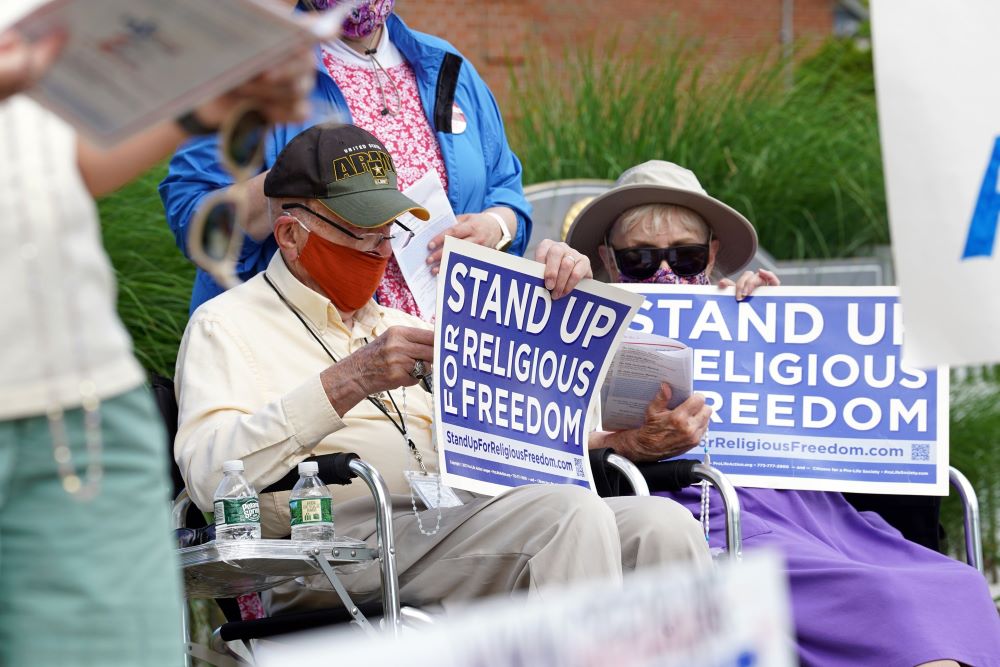Sun shines through a statue of Christ on a grave marker alongside an American flag at St. Mary Catholic Cemetery in Appleton, Wis., in this 2018 photo. (OSV News/Bradley Birkholz)
One hundred and thirty years ago, most Catholic bishops in the United States thought that there was too much religious liberty.
In those days, a conflict simmered over whether Catholics could accept a state that does not privilege the Catholic Church. New York's Archbishop Michael Corrigan worried that "liberalizing tendencies" would result from accepting a religious liberty that would make the Catholic Church equal to other religious groups. Perhaps he worried that Catholics might get the idea that other believers make valid faith claims.
Over time, others like Baltimore's Cardinal James Gibbons prevailed. Gibbons held that the climate of freedom in the United States is one where the Catholic Church "blossoms like a rose," and there was nothing to fear. That perspective itself blossomed in the Second Vatican Council's Dignitatis humanae (Declaration on Religious Freedom).
Recent years have found the bishops of the United States more concerned that there is too little religious freedom — but in strange ways that still sound like Archbishop Corrigan. The bishops have taken up religious liberty as a special concern since 2012, and their Committee for Religious Liberty recently published an "Annual Report on the State of Religious Liberty in the United States" for 2024. The report has an alarming tone and catalogs "threats to religious liberty."
An even more recent incident involving Winona-Rochester, Minnesota, Bishop Robert Barron and Heidi Pryzbyla of Politico illustrates the strangeness of the place where the Catholic engagement with religious liberty finds itself in 2024. In a Feb. 23 MSNBC interview, Pryzbyla said that Christian nationalists believe our rights come from God, not government. Barron criticized her comments on social media, and in a later interview with the conservative Washington Examiner, expressed the Catholic perspective that rights like religious liberty "come from God." He linked what he called "Jefferson's great teaching" about man's inalienable rights endowed by the Creator, to the Catholic belief in natural law that he says is opposed by a "secular ideology."
The church and many Catholics have a hard time thinking about political life without an instinct to claim a special place in the public square.
From Corrigan to Barron, the church has not really grappled with fundamental issues concerning religious liberty in the United States. The Roman Catholic Church always has struggled with religious liberty because we have not disentangled our claims about the dignity of every conscience from the historical legacy of Christendom. For 1,000 years, roughly from the end of the Roman Empire to the Reformation, Rome was the one authority in the church, and that authority also encompassed the state. Even centuries since the Reformation began to draw that situation to a close, the church still struggles to shake off an instinct to assert itself over the state and other believers.
The church and many Catholics have a hard time thinking about political life without an instinct to claim a special place in the public square. Quite often our claims of religious liberty turn out to be one-sided for that reason. We insist religious liberty is not a Catholic issue, it is an American issue. But often we Catholics seem more hesitant to acknowledge that religious liberty is equally important for other believers and nonbelievers.
The bishops' Report on Religious Liberty offers strong evidence. The report names "The Five Largest Threats to Religious Liberty in 2024" as:
- Attacks on houses of worship;
- Regulations requiring hospitals receiving public funds to offer gender-affirming care;
- Denying public aid to ministries serving migrants;
- Regulations prohibiting discrimination on the basis of gender identity;
- Regulations requiring paid leave for employees to procure an abortion.
The most striking thing about this list is that, while perhaps all of them represent challenges for Catholicism in particular, none of them represents a threat to true religious liberty — except in the most expansive sense we could imagine.

Eric and Anne Waxman recite the rosary while participating in a roadside prayer rally at St. James Church in Setauket, N.Y., June 24, 2020, to mark Religious Freedom Week (CNS/Gregory Shemitz)
The protection of religious liberty under the U.S. Constitution is a protection against intrusions by government. It is not a protection from the actions of private citizens, and neither is it a guarantee of government support. Religious liberty is not a broad social license. It has specific legal and constitutional meaning. The bishops make the point that religious liberty is more than freedom of worship. Surely that is true, but just as surely in a republic home to many different believers, Catholics must recognize fair limits on our rights where they conflict with the rights of others.
Our Catholic instinct to think of our own liberty more expansively than what is contained by constitutional boundaries is visible in these USCCB documents. Restrictions on public aid designed to protect others need to be balanced with our religious liberty claims, not steamrolled by them. Painting everything with religious liberty this way trivializes legitimate defenses of our first, most cherished liberty.
The USCCB also makes a theological argument, of course. Drawing from the teachings of the Second Vatican Council, the report insists that "human persons should not be forced to act contrary to their religious convictions." But another theological claim of the report is more eye-catching. Writing about religious liberty, the bishops remind us that, "In Catholic teaching, rights and duties are reciprocal. So, while people have a right not to be coerced on religious issues, the right carries with it the responsibility to seek the truth about God and to live in accordance with that truth." That's really the heart of the problem.
Pope John XXIII titled paragraph 30 his 1963 encyclical Pacem in Terris: "Reciprocity of Right and Duties Between Persons." But the U.S. bishops do not seem to address or acknowledge the issue of "recognizing and respecting" the rights of others that Pope John writes of in that paragraph.
Advertisement
The problem becomes clearer when the Catholic idea of religious liberty bumps up against people who do not "seek the truth about God" at all. Our Catholic tradition does not respect a right to unbelief. Catholicism sees religious liberty quite unlike the way the constitution understands it. These differences are not recognized by the bishops' report or elsewhere. Readers of those documents would be forgiven for thinking the constitutional tradition and the Catholic tradition agree. But they don't. They never did.
Our constitutional framers never intended it to be so narrow. In 1786, Thomas Jefferson's Virginia Statute for Religious Freedom protected all opinions about religion, including atheism. James Madison lamented the appointments of congressional chaplains and advocated "the total separation of church from the state." The bishops cite both Jefferson and Madison, but their real views never surface in the bishops' documents. Those documents never grapple with the important differences between our theology and the constitutional tradition. The effect of all this makes it seem like the bishops are substituting our theology for that tradition.
We Catholics do believe and certainly are free to believe in our own standard of religious liberty and the religious roots of law. But we are only just as free as anyone else to believe as they see fit under this constitutional system. Pope John and other parts of our tradition would seem to say we can agree with that proposition, too.
But recognizing that is what U.S. Catholics are missing when we talk about "Jefferson’s great teaching."





